Self-care Assessment
VerifiedAdded on 2023/03/30
|9
|1528
|284
AI Summary
This self-care assessment worksheet allows you to assess your self-care habits and rate yourself on various areas of self-care. It helps you identify patterns in your responses and areas for improvement. The assessment covers physical, psychological, emotional, spiritual, relationship, and workplace self-care. It also includes a stress test and a lifestyle behaviors assessment. Use this worksheet to prioritize self-care and improve your overall well-being.
Contribute Materials
Your contribution can guide someone’s learning journey. Share your
documents today.
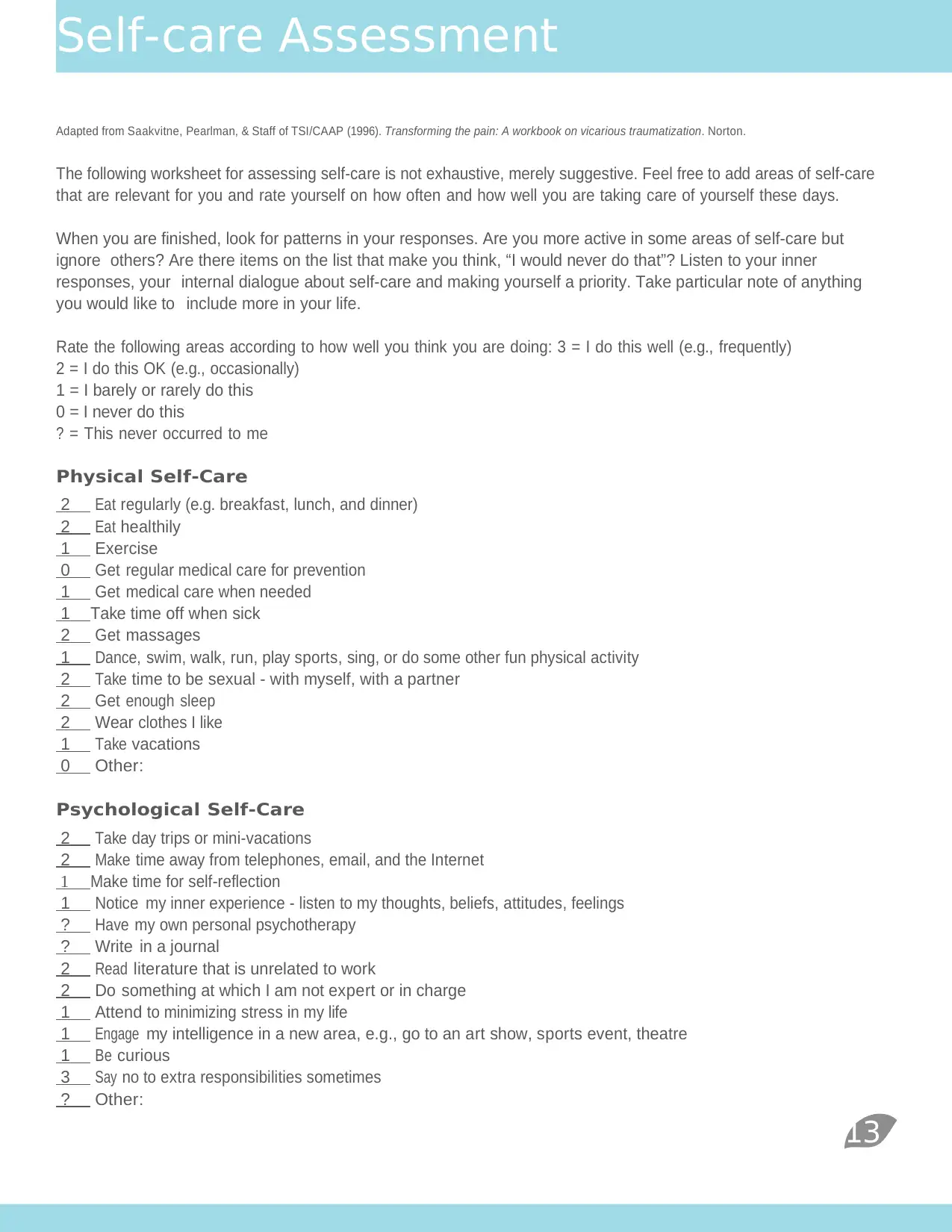
Self-care Assessment
Adapted from Saakvitne, Pearlman, & Staff of TSI/CAAP (1996). Transforming the pain: A workbook on vicarious traumatization. Norton.
The following worksheet for assessing self-care is not exhaustive, merely suggestive. Feel free to add areas of self-care
that are relevant for you and rate yourself on how often and how well you are taking care of yourself these days.
When you are finished, look for patterns in your responses. Are you more active in some areas of self-care but
ignore others? Are there items on the list that make you think, “I would never do that”? Listen to your inner
responses, your internal dialogue about self-care and making yourself a priority. Take particular note of anything
you would like to include more in your life.
Rate the following areas according to how well you think you are doing: 3 = I do this well (e.g., frequently)
2 = I do this OK (e.g., occasionally)
1 = I barely or rarely do this
0 = I never do this
? = This never occurred to me
Physical Self-Care
2 Eat regularly (e.g. breakfast, lunch, and dinner)
2 Eat healthily
1 Exercise
0 Get regular medical care for prevention
1 Get medical care when needed
1 Take time off when sick
2 Get massages
1 Dance, swim, walk, run, play sports, sing, or do some other fun physical activity
2 Take time to be sexual - with myself, with a partner
2 Get enough sleep
2 Wear clothes I like
1 Take vacations
0 Other:
Psychological Self-Care
2 Take day trips or mini-vacations
2 Make time away from telephones, email, and the Internet
1 Make time for self-reflection
1 Notice my inner experience - listen to my thoughts, beliefs, attitudes, feelings
? Have my own personal psychotherapy
? Write in a journal
2 Read literature that is unrelated to work
2 Do something at which I am not expert or in charge
1 Attend to minimizing stress in my life
1 Engage my intelligence in a new area, e.g., go to an art show, sports event, theatre
1 Be curious
3 Say no to extra responsibilities sometimes
? Other:
13
Adapted from Saakvitne, Pearlman, & Staff of TSI/CAAP (1996). Transforming the pain: A workbook on vicarious traumatization. Norton.
The following worksheet for assessing self-care is not exhaustive, merely suggestive. Feel free to add areas of self-care
that are relevant for you and rate yourself on how often and how well you are taking care of yourself these days.
When you are finished, look for patterns in your responses. Are you more active in some areas of self-care but
ignore others? Are there items on the list that make you think, “I would never do that”? Listen to your inner
responses, your internal dialogue about self-care and making yourself a priority. Take particular note of anything
you would like to include more in your life.
Rate the following areas according to how well you think you are doing: 3 = I do this well (e.g., frequently)
2 = I do this OK (e.g., occasionally)
1 = I barely or rarely do this
0 = I never do this
? = This never occurred to me
Physical Self-Care
2 Eat regularly (e.g. breakfast, lunch, and dinner)
2 Eat healthily
1 Exercise
0 Get regular medical care for prevention
1 Get medical care when needed
1 Take time off when sick
2 Get massages
1 Dance, swim, walk, run, play sports, sing, or do some other fun physical activity
2 Take time to be sexual - with myself, with a partner
2 Get enough sleep
2 Wear clothes I like
1 Take vacations
0 Other:
Psychological Self-Care
2 Take day trips or mini-vacations
2 Make time away from telephones, email, and the Internet
1 Make time for self-reflection
1 Notice my inner experience - listen to my thoughts, beliefs, attitudes, feelings
? Have my own personal psychotherapy
? Write in a journal
2 Read literature that is unrelated to work
2 Do something at which I am not expert or in charge
1 Attend to minimizing stress in my life
1 Engage my intelligence in a new area, e.g., go to an art show, sports event, theatre
1 Be curious
3 Say no to extra responsibilities sometimes
? Other:
13
Secure Best Marks with AI Grader
Need help grading? Try our AI Grader for instant feedback on your assignments.
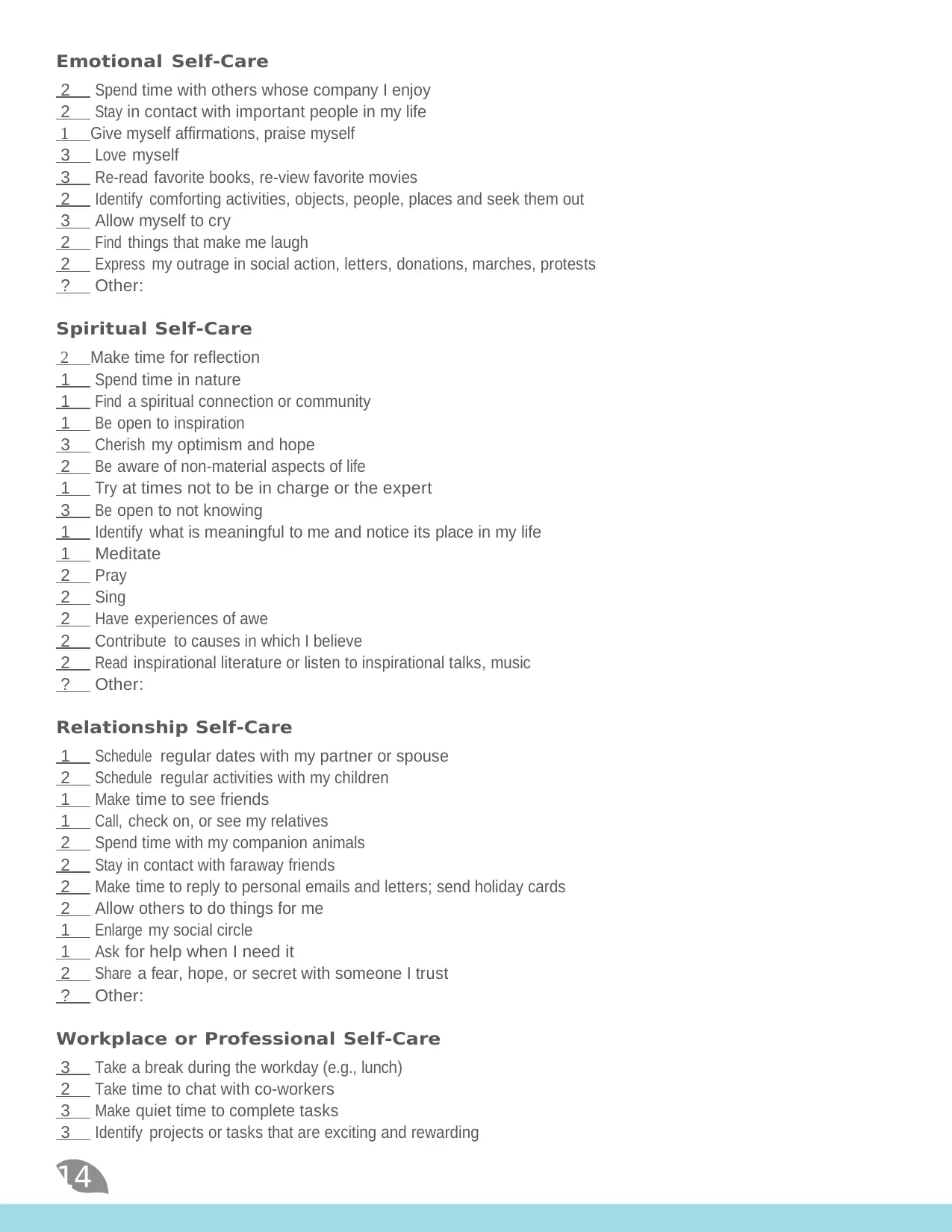
Emotional Self-Care
2 Spend time with others whose company I enjoy
2 Stay in contact with important people in my life
1 Give myself affirmations, praise myself
3 Love myself
3 Re-read favorite books, re-view favorite movies
2 Identify comforting activities, objects, people, places and seek them out
3 Allow myself to cry
2 Find things that make me laugh
2 Express my outrage in social action, letters, donations, marches, protests
? Other:
Spiritual Self-Care
2 Make time for reflection
1 Spend time in nature
1 Find a spiritual connection or community
1 Be open to inspiration
3 Cherish my optimism and hope
2 Be aware of non-material aspects of life
1 Try at times not to be in charge or the expert
3 Be open to not knowing
1 Identify what is meaningful to me and notice its place in my life
1 Meditate
2 Pray
2 Sing
2 Have experiences of awe
2 Contribute to causes in which I believe
2 Read inspirational literature or listen to inspirational talks, music
? Other:
Relationship Self-Care
1 Schedule regular dates with my partner or spouse
2 Schedule regular activities with my children
1 Make time to see friends
1 Call, check on, or see my relatives
2 Spend time with my companion animals
2 Stay in contact with faraway friends
2 Make time to reply to personal emails and letters; send holiday cards
2 Allow others to do things for me
1 Enlarge my social circle
1 Ask for help when I need it
2 Share a fear, hope, or secret with someone I trust
? Other:
Workplace or Professional Self-Care
3 Take a break during the workday (e.g., lunch)
2 Take time to chat with co-workers
3 Make quiet time to complete tasks
3 Identify projects or tasks that are exciting and rewarding
14
2 Spend time with others whose company I enjoy
2 Stay in contact with important people in my life
1 Give myself affirmations, praise myself
3 Love myself
3 Re-read favorite books, re-view favorite movies
2 Identify comforting activities, objects, people, places and seek them out
3 Allow myself to cry
2 Find things that make me laugh
2 Express my outrage in social action, letters, donations, marches, protests
? Other:
Spiritual Self-Care
2 Make time for reflection
1 Spend time in nature
1 Find a spiritual connection or community
1 Be open to inspiration
3 Cherish my optimism and hope
2 Be aware of non-material aspects of life
1 Try at times not to be in charge or the expert
3 Be open to not knowing
1 Identify what is meaningful to me and notice its place in my life
1 Meditate
2 Pray
2 Sing
2 Have experiences of awe
2 Contribute to causes in which I believe
2 Read inspirational literature or listen to inspirational talks, music
? Other:
Relationship Self-Care
1 Schedule regular dates with my partner or spouse
2 Schedule regular activities with my children
1 Make time to see friends
1 Call, check on, or see my relatives
2 Spend time with my companion animals
2 Stay in contact with faraway friends
2 Make time to reply to personal emails and letters; send holiday cards
2 Allow others to do things for me
1 Enlarge my social circle
1 Ask for help when I need it
2 Share a fear, hope, or secret with someone I trust
? Other:
Workplace or Professional Self-Care
3 Take a break during the workday (e.g., lunch)
2 Take time to chat with co-workers
3 Make quiet time to complete tasks
3 Identify projects or tasks that are exciting and rewarding
14
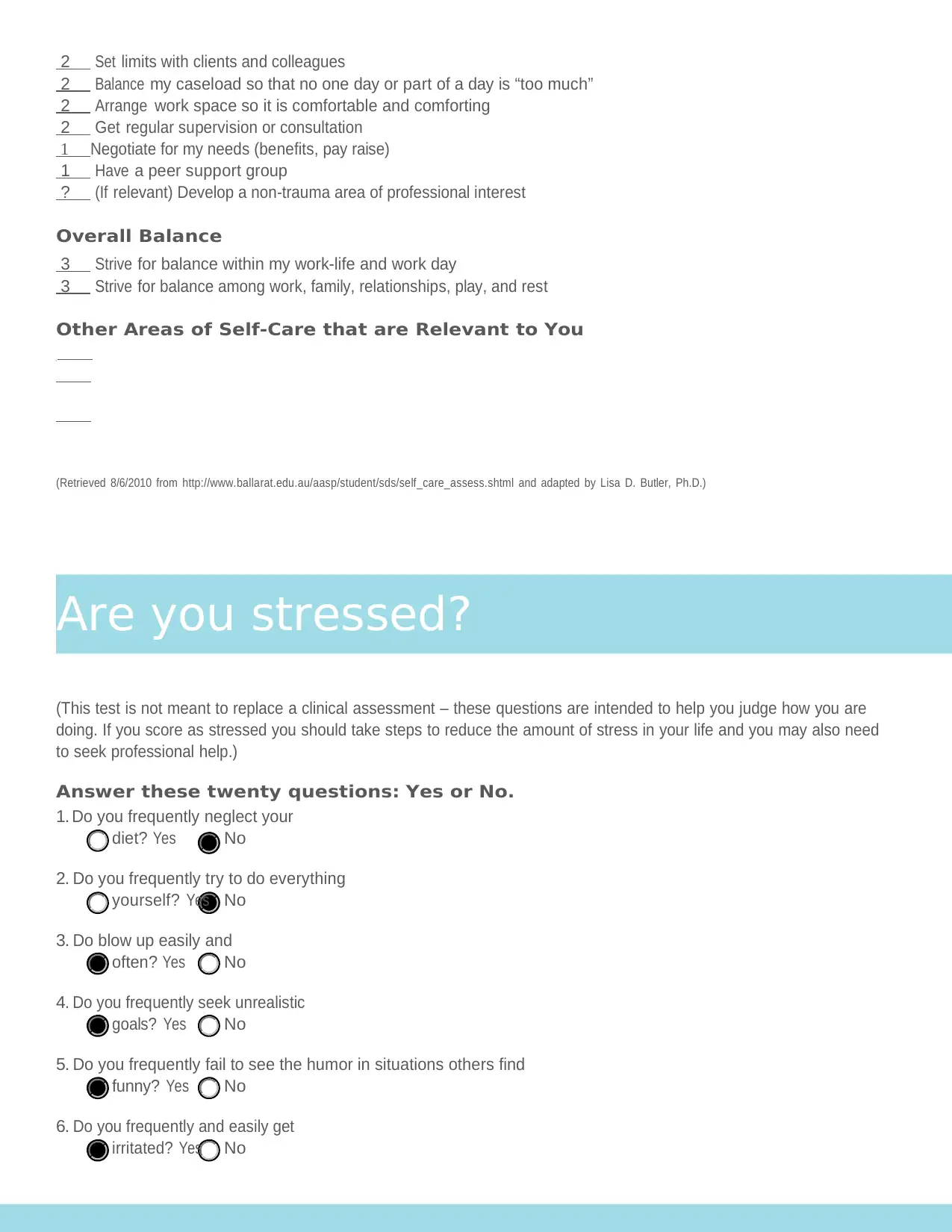
Are you stressed?
2 Set limits with clients and colleagues
2 Balance my caseload so that no one day or part of a day is “too much”
2 Arrange work space so it is comfortable and comforting
2 Get regular supervision or consultation
1 Negotiate for my needs (benefits, pay raise)
1 Have a peer support group
? (If relevant) Develop a non-trauma area of professional interest
Overall Balance
3 Strive for balance within my work-life and work day
3 Strive for balance among work, family, relationships, play, and rest
Other Areas of Self-Care that are Relevant to You
2
(Retrieved 8/6/2010 from http://www.ballarat.edu.au/aasp/student/sds/self_care_assess.shtml and adapted by Lisa D. Butler, Ph.D.)
(This test is not meant to replace a clinical assessment – these questions are intended to help you judge how you are
doing. If you score as stressed you should take steps to reduce the amount of stress in your life and you may also need
to seek professional help.)
Answer these twenty questions: Yes or No.
1. Do you frequently neglect your
diet? Yes No
2. Do you frequently try to do everything
yourself? Yes No
3. Do blow up easily and
often? Yes No
4. Do you frequently seek unrealistic
goals? Yes No
5. Do you frequently fail to see the humor in situations others find
funny? Yes No
6. Do you frequently and easily get
irritated? Yes No
2 Set limits with clients and colleagues
2 Balance my caseload so that no one day or part of a day is “too much”
2 Arrange work space so it is comfortable and comforting
2 Get regular supervision or consultation
1 Negotiate for my needs (benefits, pay raise)
1 Have a peer support group
? (If relevant) Develop a non-trauma area of professional interest
Overall Balance
3 Strive for balance within my work-life and work day
3 Strive for balance among work, family, relationships, play, and rest
Other Areas of Self-Care that are Relevant to You
2
(Retrieved 8/6/2010 from http://www.ballarat.edu.au/aasp/student/sds/self_care_assess.shtml and adapted by Lisa D. Butler, Ph.D.)
(This test is not meant to replace a clinical assessment – these questions are intended to help you judge how you are
doing. If you score as stressed you should take steps to reduce the amount of stress in your life and you may also need
to seek professional help.)
Answer these twenty questions: Yes or No.
1. Do you frequently neglect your
diet? Yes No
2. Do you frequently try to do everything
yourself? Yes No
3. Do blow up easily and
often? Yes No
4. Do you frequently seek unrealistic
goals? Yes No
5. Do you frequently fail to see the humor in situations others find
funny? Yes No
6. Do you frequently and easily get
irritated? Yes No

15
Secure Best Marks with AI Grader
Need help grading? Try our AI Grader for instant feedback on your assignments.
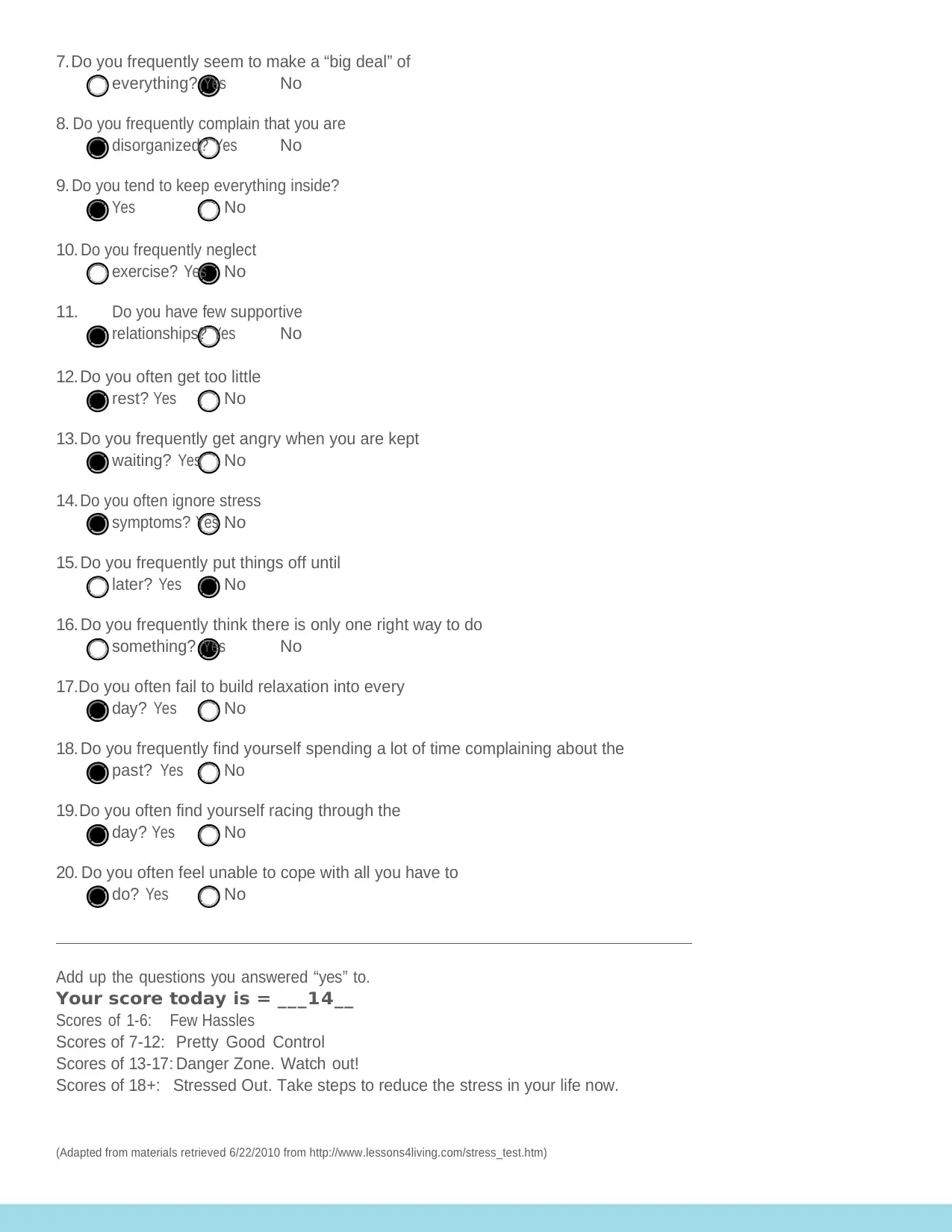
7. Do you frequently seem to make a “big deal” of
everything? Yes No
8. Do you frequently complain that you are
disorganized? Yes No
9. Do you tend to keep everything inside?
Yes No
10. Do you frequently neglect
exercise? Yes No
11. Do you have few supportive
relationships? Yes No
12. Do you often get too little
rest? Yes No
13. Do you frequently get angry when you are kept
waiting? Yes No
14. Do you often ignore stress
symptoms? Yes No
15. Do you frequently put things off until
later? Yes No
16. Do you frequently think there is only one right way to do
something? Yes No
17. Do you often fail to build relaxation into every
day? Yes No
18. Do you frequently find yourself spending a lot of time complaining about the
past? Yes No
19. Do you often find yourself racing through the
day? Yes No
20. Do you often feel unable to cope with all you have to
do? Yes No
Add up the questions you answered “yes” to.
Your score today is = ___14__
Scores of 1-6: Few Hassles
Scores of 7-12: Pretty Good Control
Scores of 13-17: Danger Zone. Watch out!
Scores of 18+: Stressed Out. Take steps to reduce the stress in your life now.
(Adapted from materials retrieved 6/22/2010 from http://www.lessons4living.com/stress_test.htm)
everything? Yes No
8. Do you frequently complain that you are
disorganized? Yes No
9. Do you tend to keep everything inside?
Yes No
10. Do you frequently neglect
exercise? Yes No
11. Do you have few supportive
relationships? Yes No
12. Do you often get too little
rest? Yes No
13. Do you frequently get angry when you are kept
waiting? Yes No
14. Do you often ignore stress
symptoms? Yes No
15. Do you frequently put things off until
later? Yes No
16. Do you frequently think there is only one right way to do
something? Yes No
17. Do you often fail to build relaxation into every
day? Yes No
18. Do you frequently find yourself spending a lot of time complaining about the
past? Yes No
19. Do you often find yourself racing through the
day? Yes No
20. Do you often feel unable to cope with all you have to
do? Yes No
Add up the questions you answered “yes” to.
Your score today is = ___14__
Scores of 1-6: Few Hassles
Scores of 7-12: Pretty Good Control
Scores of 13-17: Danger Zone. Watch out!
Scores of 18+: Stressed Out. Take steps to reduce the stress in your life now.
(Adapted from materials retrieved 6/22/2010 from http://www.lessons4living.com/stress_test.htm)

16
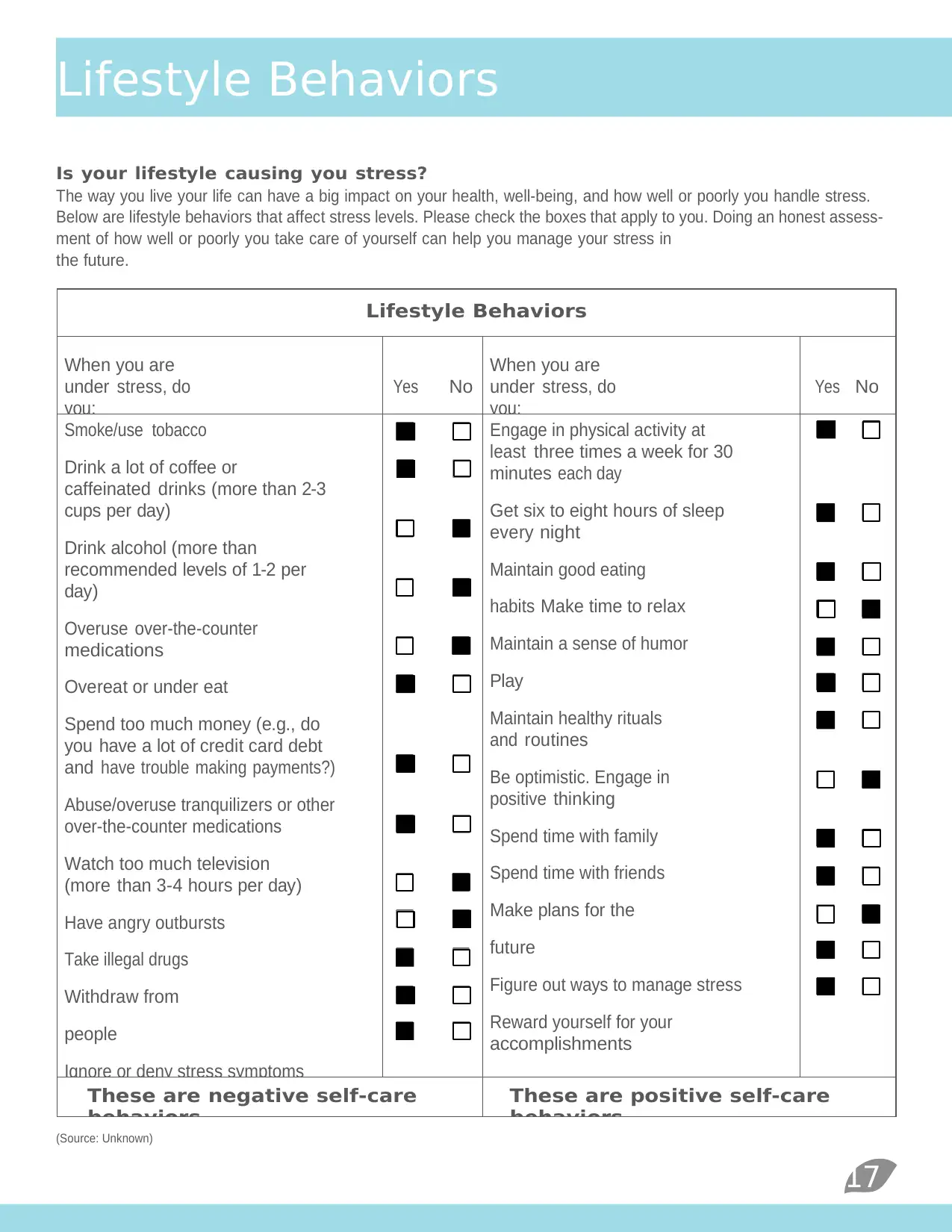
Lifestyle Behaviors
Is your lifestyle causing you stress?
The way you live your life can have a big impact on your health, well-being, and how well or poorly you handle stress.
Below are lifestyle behaviors that affect stress levels. Please check the boxes that apply to you. Doing an honest assess-
ment of how well or poorly you take care of yourself can help you manage your stress in
the future.
Lifestyle Behaviors
When you are
under stress, do
you:
Yes No
When you are
under stress, do
you:
Yes No
Smoke/use tobacco
Drink a lot of coffee or
caffeinated drinks (more than 2-3
cups per day)
Drink alcohol (more than
recommended levels of 1-2 per
day)
Overuse over-the-counter
medications
Overeat or under eat
Spend too much money (e.g., do
you have a lot of credit card debt
and have trouble making payments?)
Abuse/overuse tranquilizers or other
over-the-counter medications
Watch too much television
(more than 3-4 hours per day)
Have angry outbursts
Take illegal drugs
Withdraw from
people
Ignore or deny stress symptoms
Engage in physical activity at
least three times a week for 30
minutes each day
Get six to eight hours of sleep
every night
Maintain good eating
habits Make time to relax
Maintain a sense of humor
Play
Maintain healthy rituals
and routines
Be optimistic. Engage in
positive thinking
Spend time with family
Spend time with friends
Make plans for the
future
Figure out ways to manage stress
Reward yourself for your
accomplishments
These are negative self-care
behaviors.
These are positive self-care
behaviors.
(Source: Unknown)
17
Is your lifestyle causing you stress?
The way you live your life can have a big impact on your health, well-being, and how well or poorly you handle stress.
Below are lifestyle behaviors that affect stress levels. Please check the boxes that apply to you. Doing an honest assess-
ment of how well or poorly you take care of yourself can help you manage your stress in
the future.
Lifestyle Behaviors
When you are
under stress, do
you:
Yes No
When you are
under stress, do
you:
Yes No
Smoke/use tobacco
Drink a lot of coffee or
caffeinated drinks (more than 2-3
cups per day)
Drink alcohol (more than
recommended levels of 1-2 per
day)
Overuse over-the-counter
medications
Overeat or under eat
Spend too much money (e.g., do
you have a lot of credit card debt
and have trouble making payments?)
Abuse/overuse tranquilizers or other
over-the-counter medications
Watch too much television
(more than 3-4 hours per day)
Have angry outbursts
Take illegal drugs
Withdraw from
people
Ignore or deny stress symptoms
Engage in physical activity at
least three times a week for 30
minutes each day
Get six to eight hours of sleep
every night
Maintain good eating
habits Make time to relax
Maintain a sense of humor
Play
Maintain healthy rituals
and routines
Be optimistic. Engage in
positive thinking
Spend time with family
Spend time with friends
Make plans for the
future
Figure out ways to manage stress
Reward yourself for your
accomplishments
These are negative self-care
behaviors.
These are positive self-care
behaviors.
(Source: Unknown)
17
Paraphrase This Document
Need a fresh take? Get an instant paraphrase of this document with our AI Paraphraser
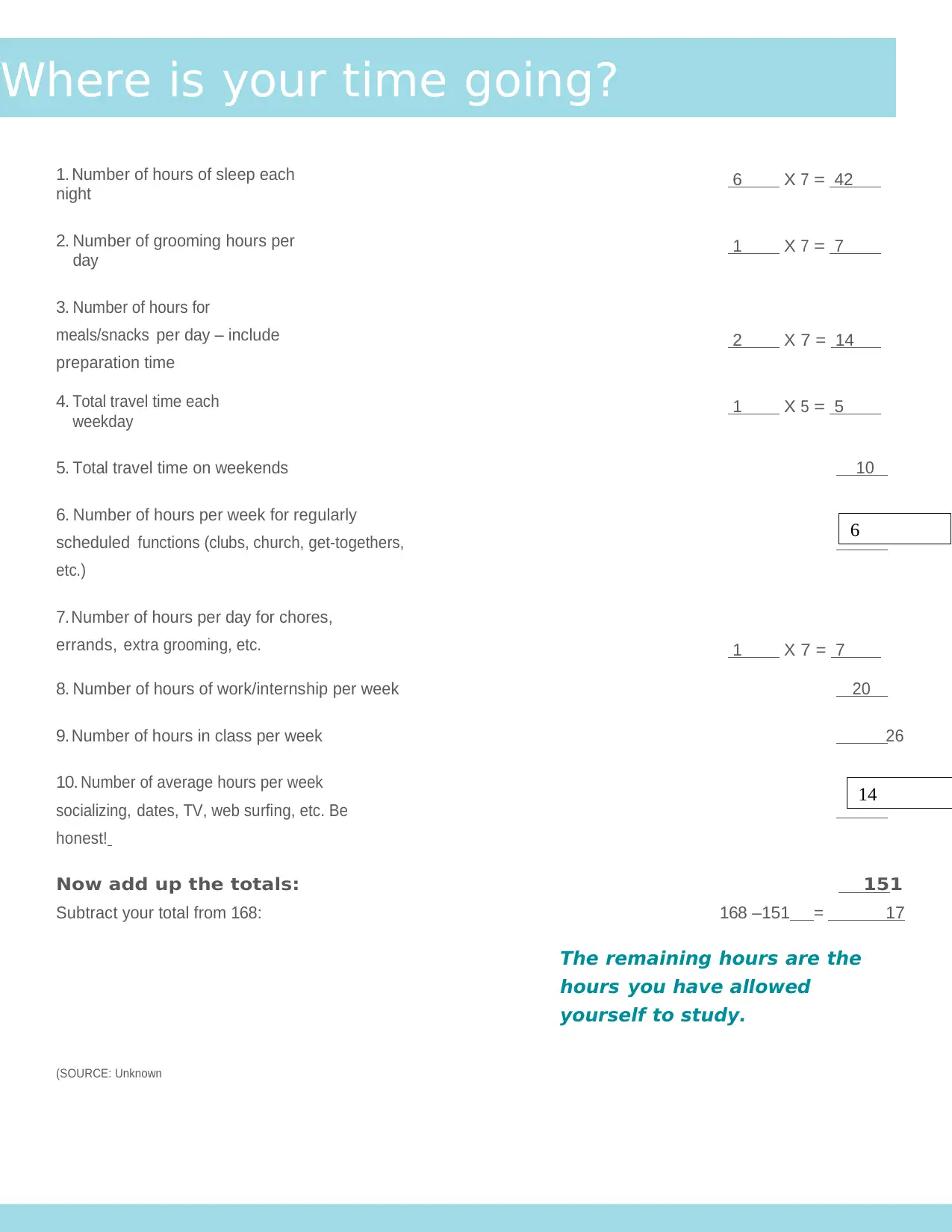
1. Number of hours of sleep each
night 6 X 7 = 42
2. Number of grooming hours per
day 1 X 7 = 7
3. Number of hours for
meals/snacks per day – include
preparation time
2 X 7 = 14
4. Total travel time each
weekday 1 X 5 = 5
5. Total travel time on weekends 10
6. Number of hours per week for regularly
scheduled functions (clubs, church, get-togethers,
etc.)
7. Number of hours per day for chores,
errands, extra grooming, etc. 1 X 7 = 7
8. Number of hours of work/internship per week 20
9. Number of hours in class per week 26
10. Number of average hours per week
socializing, dates, TV, web surfing, etc. Be
honest!
Now add up the totals: 151
Subtract your total from 168: 168 –151 = 17
The remaining hours are the
hours you have allowed
yourself to study.
(SOURCE: Unknown
Where is your time going?
6
14
night 6 X 7 = 42
2. Number of grooming hours per
day 1 X 7 = 7
3. Number of hours for
meals/snacks per day – include
preparation time
2 X 7 = 14
4. Total travel time each
weekday 1 X 5 = 5
5. Total travel time on weekends 10
6. Number of hours per week for regularly
scheduled functions (clubs, church, get-togethers,
etc.)
7. Number of hours per day for chores,
errands, extra grooming, etc. 1 X 7 = 7
8. Number of hours of work/internship per week 20
9. Number of hours in class per week 26
10. Number of average hours per week
socializing, dates, TV, web surfing, etc. Be
honest!
Now add up the totals: 151
Subtract your total from 168: 168 –151 = 17
The remaining hours are the
hours you have allowed
yourself to study.
(SOURCE: Unknown
Where is your time going?
6
14

1 out of 9
Related Documents
Your All-in-One AI-Powered Toolkit for Academic Success.
+13062052269
info@desklib.com
Available 24*7 on WhatsApp / Email
![[object Object]](/_next/static/media/star-bottom.7253800d.svg)
Unlock your academic potential
© 2024 | Zucol Services PVT LTD | All rights reserved.




